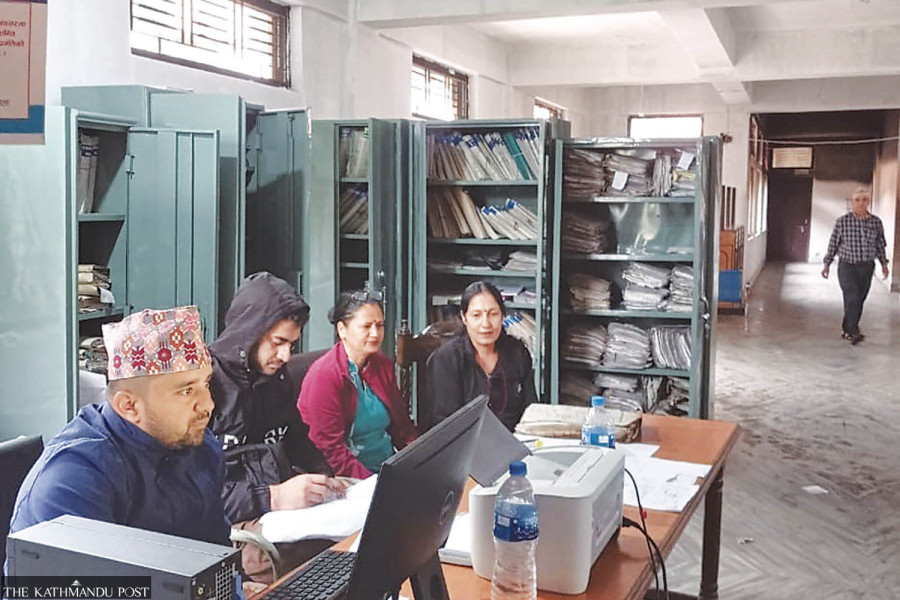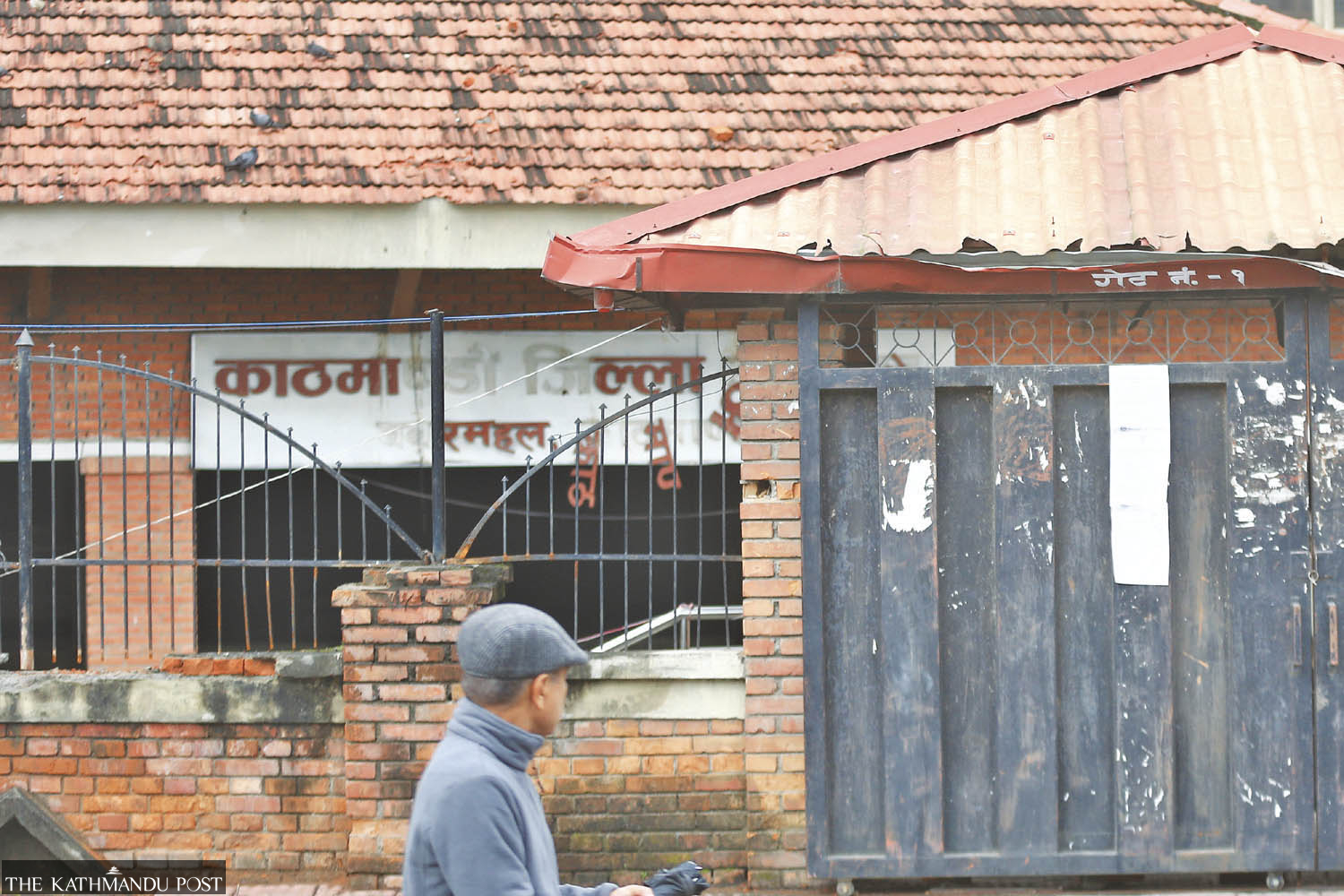National
Courts, ravaged by arson and vandalism, resume limited services amid severe losses
Most courts are functioning with makeshift arrangements, minimal equipment and loss of documents that could take years to recover.
Post National Bureau
Nearly two months after widespread arson and vandalism during the September 9 protests, courts across the country are struggling to resume regular judicial services. Some courts have restored partial operations while most are functioning with makeshift arrangements, minimal equipment and loss of documents that could take months, or even years, to recover.
The fire at the High Court in Biratnagar destroyed the main building, the chief judge’s quarters, a guesthouse, and the office of the registrar, along with invaluable judicial records.
According to Santosh Pokharel, the court’s information officer, all archives preserved since 1953 were reduced to ashes. “Historical case files, citizens’ land ownership documents, precedents, and verdicts have all been lost,” he said. In the record section alone, 3,234 files were destroyed, while only about 1,400 were salvaged.
Although the high court has resumed operations, Pokharel said the lack of infrastructure and equipment has made it difficult to function smoothly. Six court vehicles and a motorcycle were burned, and many computers were stolen, further hindering daily work. Preliminary assessments estimate the physical damage at around Rs36.5 million.
The court building, inaugurated by then chief justice Damodar Prasad Sharma in April 2014, has been partially repaired and repainted. “We are operating from the same burnt structure, but it’s not easy,” Pokharel said. “Without the old archives, it’s nearly impossible to restart pending cases.”
The Chitwan district court, heavily damaged during the violent protests on September 9, has been struggling to restore normal operations despite reopening partially after a week. Court officials say services are being provided from makeshift courtrooms amid severe shortages of computers, furniture, and basic facilities.
According to court information officer Amrit Bishwakarma, the fire destroyed case files, records, and office equipment. “When the fire broke out, 670 active case files were stored in the court. We have issued a notice asking parties concerned to contact the court within 30 days,” he said. Of the eight sections, only some files from sections five, six, and seven survived.
The court, which previously operated eight benches, now runs five—four in partially repaired rooms and one in a temporary shed. Bishwakarma said the estimated loss amounts to Rs64.9 million, including the destruction of buildings, vehicles, furniture and computers.

“Though services have started, problems persist. We are working with only 13 computers, three printers, and one scanner,” he said. Before the fire, the court had 57 computers, 31 printers and 14 scanners, almost all of which were destroyed.
The office remains unsafe and poorly equipped—windows and doors don’t close properly, electrical wiring is unstable, and there is no power backup. Police and court staff guard the premises day and night. “We have managed some minor repairs and repainting, but everything is temporary. Even a short power cut halts our work,” Bishwakarma added.
Meanwhile, the Hetauda bench of the Patan High Court, also damaged in the same protest, will fully resume services from Sunday. The fire had destroyed one of its four courtrooms and caused an estimated loss of Rs35.3 million. “We are restarting hearings from Sunday after completing necessary repairs,” said Deputy Registrar Badri Prasad Lamichhane.
The Tanahun district court, which was reduced to ashes during the violent protests, will begin scheduling hearings from November 17. The court had resumed limited services from September 14, three days after the arson attack, but full judicial operations remain suspended due to the destruction of all case files, records, computers, and furniture.
Court registrar Nanda Prasad Acharya said only essential services were initially resumed through handwritten notices, including marriage registration, kinship verification, habeas corpus petitions, warrant extensions, and remand approvals.
“We didn’t even have chairs, tables, or computers. Delivering services under such conditions has been extremely difficult,” Acharya said. With support from local institutions and individuals, the court has gradually managed to gather basic furniture and office equipment.
All files and archives—over 1,026 ongoing cases and 1,611 documents—were destroyed, and the court’s hard drive was stolen. Of the three courtrooms, two were completely burnt, leaving only one partially usable. Records of verdicts issued between 2007 and 2012 were lost. The court is now reconstructing case files with the help of the district police, litigants, and related offices. “About 70 percent of the necessary documents have been recollected so far,” Acharya said. The court expects to begin hearings on November 17 following a new directive from the Supreme Court.
In Kaski, court services have been operating from tents, sheds, and damaged buildings since the arson. “We are conducting hearings wherever space is available,” said information officer Ram Bahadur Kisan. After partial operations before Tihar, the court resumed full services on October 28. Some hearings now take place in the judge’s damaged residence and adjoining buildings marked unsafe.
Before the fire, the Kaski district court had eight benches; one judge’s transfer and the damage reduced the active benches to five. On Friday alone, 16 hearings were conducted across five benches despite shortages of basic infrastructure. Around 30 percent of the court’s 70,000 files and records were destroyed. “We had around 60 computers—all burnt,” Kisan said.
Likewise, the Banke district court has resumed only limited services from two small rooms. According to court information officer Tirtharaj Acharya, the lack of resources has made it impossible to fully restore operations. “All computers, printers, and photocopy machines were burnt, making work extremely difficult,” he said. A technical team is studying the site to decide how and from where services can be resumed. Only 770 case files were found intact. The court has been running two or three benches in rotation to handle urgent cases.
The Tulsipur High Court, which also suffered severe fire damage, has been declared unsafe and marked with a red sticker. “We are conducting administrative work from the police barracks and hearings inside a garage,” said Registrar Yam Prasad Baskota. The court remained closed for five days and took nearly a month to resume regular services.
Baskota said efforts are ongoing to collect remnants of destroyed files. The court has resumed accepting new writs and petitions from district courts. The fire also destroyed the main building, five vehicles, and four motorcycles, causing losses worth around Rs300 million.
(Parbat Portel in Biratnagar, Ramesh Kumar Paudel in Chitwan, Pratap Bista in Hetauda, Samjhana Rasaili in Tanahun, Anup Paudel in Kaski, Rupa Gahatraj in Nepalgunj and Durgalal KC in Dang reported this story.)




 11.12°C Kathmandu
11.12°C Kathmandu














